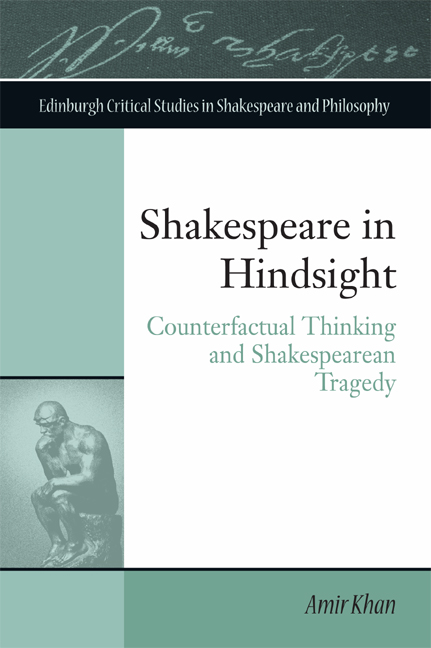Book contents
- Frontmatter
- Contents
- Acknowledgements
- A Note on Texts
- Series Editor's Preface
- Dedication
- 1 Introduction
- 2 My Kingdom for a Ghost: Counterfactual Thinking and Hamlet
- 3 Reversing Good and Evil: Counterfactual Thinking and King Lear
- 4 Staging Passivity: Counterfactual Thinking and Macbeth
- 5 Reversing Time: Counterfactual Thinking and The Winter's Tale
- 6 ‘Why Indeed Did I Marry?’: Counterfactual Thinking and Othello
- 7 Conclusion
- Notes
- Further Reading
- Index
5 - Reversing Time: Counterfactual Thinking and The Winter's Tale
Published online by Cambridge University Press: 05 August 2016
- Frontmatter
- Contents
- Acknowledgements
- A Note on Texts
- Series Editor's Preface
- Dedication
- 1 Introduction
- 2 My Kingdom for a Ghost: Counterfactual Thinking and Hamlet
- 3 Reversing Good and Evil: Counterfactual Thinking and King Lear
- 4 Staging Passivity: Counterfactual Thinking and Macbeth
- 5 Reversing Time: Counterfactual Thinking and The Winter's Tale
- 6 ‘Why Indeed Did I Marry?’: Counterfactual Thinking and Othello
- 7 Conclusion
- Notes
- Further Reading
- Index
Summary
The idea that the march of history moves in a particular direction, developing in a linear fashion upward to irreversible progress, is one that dates from the nineteenth century. The nineteenth century, with its belief in the triumph of science and the spread of the catastrophic optimism of Marxist theories, was the period when those ideas superseded a concept of cyclical history characterized by regressions and leaps forward … The birth of these views in the nineteenth century … made it possible to establish the idea that time is a neutral quality that is measurable and is characterized by non-repetition. In the magic, primitive view, in contrast, time is apprehended as discontinuous (periods of disorder or festivity alternate with the everyday), uneven (some days are propitious, some unpropitious) and cyclical (by analogy with natural, organic rhythms).
François LaroqueFrançois Laroque's comments about the passage of time as a nineteenth-century invention mirrors Steiner's critique of redemption and suggests that myths of reason are what set the mind in motion. Tragedy is reconceived as something no longer to be celebrated via ritual performance, but something the possible occurrence of which in human affairs must be prevented or avoided at all costs. The early modern conception of tragedy, moving inexorably away from ritual and country festival, is caught up in material fantasies of progress making its unfolding irreversible. A stagnant view of tragedy and its occurrence (revisiting it through ritual) is considered ‘magic’ and ‘primitive’ and is indicative of our surrender to fates outside of our control.
Paul A. Kottman, distinguishing between Attic and early modern tragedy, similarly registers the gravity of Shakespeare's achievement. On Attic tragedy first, Kottman notes:
[T]ragic representation becomes central to civic discourse in moments at which the city seeks to question its own value or sustainability, as in fifth-century bce Athens. Tragedies like Oedipus and Antigone ask us to consider how we can best … transmit the conditions of living with one another … Indeed, it may be that we come to measure the significance or value of our bodily lives together in terms of its worldly inheritability – the relative transmissibility of rights, entitlements, possessions, institutions, and prerogatives that we might wish to bestow on those we love.
- Type
- Chapter
- Information
- Shakespeare in HindsightCounterfactual Thinking and Shakespearean Tragedy, pp. 101 - 120Publisher: Edinburgh University PressPrint publication year: 2015



